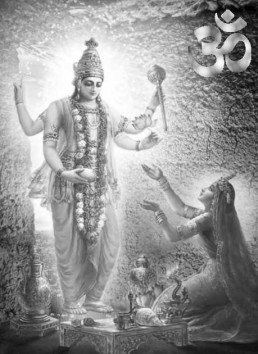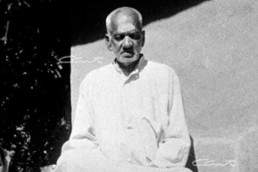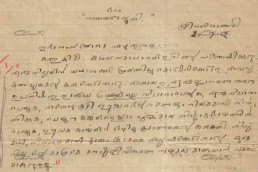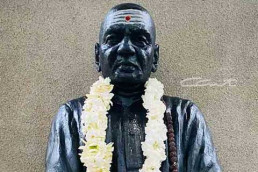
By Swami Tapovanam
English Translation by Swami Chinmayananda
This is an excerpt from the final portion of the tiny book titled ‘Glory of Brahma Vidyā’ published by the Central Chinmaya Tapovan Trust. It was originally written in Sanskrit by Sri Swami Tapovanam for the Vedanta volume of ‘Kalyan’ and was later translated into English by Pujya Gurudev Swami Chinmayananda and published serially in Tapovan Prasad from July to September 1968. Then it was brought out in book form. Since very few people know about its existence, we are publishing an excerpt here.

By Swami Tapovanam
English Translation by Swami Chinmayananda
This is an excerpt from the final portion of the tiny book titled ‘Glory of Brahma Vidyā’ published by the Central Chinmaya Tapovan Trust. It was originally written in Sanskrit by Sri Swami Tapovanam for the Vedanta volume of ‘Kalyan’ and was later translated into English by Pujya Gurudev Swami Chinmayananda and published serially in Tapovan Prasad from July to September 1968. Then it was brought out in book form. Since very few people know about its existence, we are publishing an excerpt here.
Knowledge is of two kinds – parā and aparā. The Vedas give aparā knowledge, because as a science, it talks of the knowledge of things; here knowledge illumines only limited objects, and this can give rise only to knowledge of the finitude – saṁsāra — and its endless experiences of attachments, hatreds etc. The Infinite-thought (akhaṇḍākāra vṛtti) rising as a result of the practice of Brahma Vidyā is called the parā knowledge. This awakes in us the experience of the infinite Reality and completely annihilates all the finite experiences of the world-of-objects (saṁsāra). Thus Vedānta Vidyā is the highest knowledge and the greatest science in every sense of the term – in its techniques, in its final goal, and in its own very nature. This is the chorus declared by all Rishis in the Vedānta text books.
That which is called as Parā Vidyā in Vedanta volumes is itself the condition of Parā Bhakti as discussed in books of devotion. Devotion is of two kinds – the path (sādhana rūpā) and the goal (phala rūpā). A close examination of and the consequent discrimination between the Lord and the devotee, between ‘That’ (tat) and ‘You’ (tvam) terms in the Mahāvākya generates a force of meditation which culminates in the experience of the Lord – the pure Brahman, the Absolute. Thereafter alone can the goal, the Parā Bhakti dawn in the bosom for experience. Thus the Parā Bhakti, pure devotion, which springs from the experience of the pure Self is in no way less than Brahma Vidyā. This explains why Sri Madhusudana Saraswati considered Parā Bhakti as the sixth stage (bhūmikā) in the 11-stage spiritual scheme of unfoldment discussed by him in his work ‘Bhagavad Bhakti Rasayanam’.
In this work, Madhusudana rightly uses the pregnant term svarūpādhigatistataḥ . The experience of the pure Brahman, the ever- pure (nirviśeṣa), the formless (nirākāra), the essence (svarūpa bhūta), as nothing other than the Self within is pure devotion – Parā Bhakti. This state is considered as one of the higher stages in the ladder of evolution towards the highest divine experience.
The seeker whose heart is rich in pure love — even if he be a person who has realised the Truth — comes to express his devotion to one of the many manifestations of the glory of the Self. He comes to court and feel his oneness with the divine in the forms of Siva, Vishnu, Rama or Krishna. This experience of perfection and the practice of Parā Bhakti makes him the best teacher of the world (Jagadguru) and he gets the gratitude of seekers in all generations. His is the true glory; he alone is the true teacher, the prophet.
The experiences of a student of Brahma Vidyā are also the experiences of a Parā Bhakta. The sacred Parā Bhakti is nothing other than the Parā Vidyā.
The infinite Saccidānanda Brahman to be ultimately realised through the science of Vedanta is both without form (nirākāra) and also with form (sākāra). The whole universe of names and forms is the glory of the Supreme only. Thus devotion to this divine form is advised and it should be practised. This is not an opinion; it is declared in the very Upanishads by the Rishis themselves.
यथा सर्वगतस्य निराकारस्य
महावायोश्च तदात्मकस्य त्वक्पतित्वेन
प्रसिद्धस्य साकारस्य महावायुदेवस्य
चाभेद एव श्रूयते सर्वत्र तद्वत् परब्रह्मणः
सर्वात्मकस्य साकारनिराकारभेदविरोधो
नास्त्येव॥
yathā sarvagatasya nirākārasya
mahāvāyośca tadātmakasya tvakpatitvena
prasiddhasya sākārasya mahāvāyudevasya
cābheda eva śrūyate sarvatra tadvat parabrahmaṇaḥ
sarvātmakasya sākāranirākārabhedavirodho
nāstyeva..
Air that is everywhere and at all times, can be comprehended by us only when the breeze comes and touches our skin. It assumes the nature of existence to us, but its pervasiveness is not minimised thereby. Similarly, Brahman, the infinite and eternal, even when worshipped with a form, cannot be contaminated by the limitations or attributes so superimposed upon it (because of the form). It is ever all pervasive, absolute and immortal. 1
त्रिलोचनं नीलकण्ठं महान्तं
ध्यात्वा मुनिर्गच्छति भूतयोनिं
umāsahāyaṃ parameśvaraṃ prabhuṃ
trilocanaṃ nīlakaṇṭhaṃ mahāntaṃ
dhyātvā munirgacchati bhūtayoniṃ
The Rishis, meditating upon the form of three-eyed Parameshwara accompanied by Uma, enter into Him and become one with Him. 2
śraddhā-bhakti-dhyānayogādavaihi
Know that eternal Truth through faith, devotion and meditation. 3
yasya deve parā bhaktiryathā deve tathā gurau
tasyaite kathitāhyarthāḥ prakāśante mahātmanaḥ..
One who has supreme devotion – Parā Bhakti – unto Parameshwara and to his own Guru, in him alone Truth comes to shine.4
2 Kaivalyopanishad, 1.7
3 Kaivalyopanishad, 1.2
4 Shvetashvatara Upanishad, 6.23
Previous Topic
Monk and the Dacoit
The way to mount Kailas was long and lonely; it was touched by eternal silence. One day, through this lonely region, a monk…
Next Topic
A Treasure Trove
It was sheer Grace that just before the magazine was going to press, four precious letters of Swami Tapovan Maharaj were…
Home Page
Homage to Sri Swami Tapovanam
The 50th anniversary edition of Tapovan Prasad (December 2011) was entirely dedicated to our Paramaguru Swami Tapovan…


